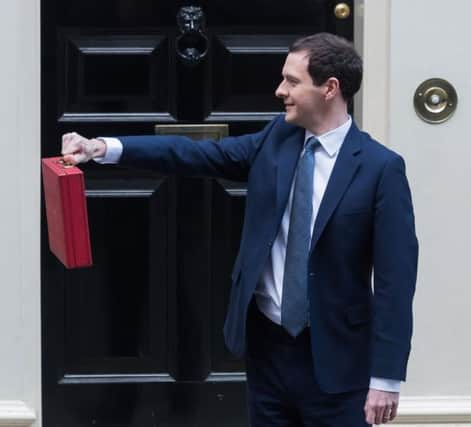Budget 2016: Slowdown blamed on '˜dangerous cocktail' of risks


The Chancellor upped the personal allowance, raised the higher rate of income tax and reduced corporation tax as he blamed a “dangerous cocktail” of global risks for a slowdown in growth and extra spending cuts to come.
The big surprise announcement of the Budget was a new levy on sugary drinks to be introduced by 2018 in an attempt to tackle the nation’s obesity crisis.
Advertisement
Hide AdAdvertisement
Hide AdAdmitting that UK debt will rise as a proportion of GDP this year, Mr Osborne revised his growth figures downwards and said another £3.5 billion of cuts were required to meet his ambition to wipe out the deficit.
While tax breaks for the North Sea energy industry were announced, it emerged that the Office for Budget Responsibility (OBR) has predicted UK oil and gas revenues would go into the red this year.
Mr Osborne said the threshold at which workers start paying the higher rate tax is to be raised from £42,385 to £45,000. But with Scotland about to receive power over income tax, Scottish ministers have indicated they think it is the wrong time for the break to be replicated north of the Border.
The Chancellor also announced that the tax-free personal allowance would be raised to £11,500.
But the harsh economic backdrop was reflected in revised economic forecasts.
Signalling more cuts, the Chancellor described the slowdown as a “dangerous cocktail” of global risks and said the UK had to “act now so we don’t have to pay later”.
The extra £3.5bn in spending cuts were required to maintain his ambition to achieve a £10.4bn surplus by 2019-20.
Advertisement
Hide AdAdvertisement
Hide AdGrowth estimates were revised down this year from 2.4 per cent to 2 per cent. Next year will see a slight improvement to 2.2 per cent, but will still be behind the previous forecast of 2.4 per cent.
The revised predictions would also see the Chancellor break his promise to cut debt as a share of GDP every year.
Debt is now expected to be 82.6 per cent of GDP in 2016-17 rather than 81.7 per cent. The OBR also pushed up its forecast for 2017-18, from 79.9 per cent to 81.3 per cent, and for 2019-20 from 77.3 per cent to 79.9 per cent.
By 2020-21 it will be 3.4 per cent higher than previously expected at 74.7 per cent.
The deficit – the amount the government spends above what it takes in – is forecast to fall next year to 2.9 per cent, rather than the 2.5 per cent anticipated before.
The Chancellor’s sugar tax will be introduced by 2018 in an attempt to tackle obesity.
The levy is expected to raise £520 million which will be invested in school sport.
• READ MORE: Budget 2016: Key points at a glance
The SNP welcomed the move, which will see Scotland benefit from the tax as a result of Barnett consequentials. It will be up to the devolved nations to decide how the cash is used.
Advertisement
Hide AdAdvertisement
Hide AdThe tax, which has the support of many health experts and the celebrity chef Jamie Oliver, will be levied on the volume of the sugar-sweetened drinks companies produce or import. There will be two bands – one for total sugar content above 5g per 100ml; a second, higher band for drinks with more than 8g per 100ml, with the levels yet to be set.
Examples of drinks which would currently fall under the higher rate of the sugar tax include full-strength Coca-Cola and Pepsi, Lucozade Energy and Irn-Bru, the Treasury said.
It is estimated the tax could result in an around 80 per cent price rise on products such as a two-litre bottle of own-brand cola.
Other policy announcements included cutting corporation tax from 20 per cent to 17 per cent by April 2020.
The higher rate of capital gains tax is to be cut from 28 per cent to 20 per cent with the basic rate dropping from 18 per cent to 10 per cent.
The severity of the challenges facing the North Sea were put in stark relief when the OBR said oil and gas revenue would be minus £10m in 2015-16 – a cataclysmic fall from the £2.2bn recorded last year and the £11bn recorded as recently as 2011-12.
Duty will be frozen on beer, cider and whisky. Tobacco duty will rise by 2 per cent for conventional smokers, with hand-rolled tobacco increasing by 3 per cent. In the wake of the Google tax bill row, there will be a fresh £12bn crackdown on tax dodging by firms and individuals.
The Chancellor announced the supplementary charge on oil and gas producers would be cut from 20 per cent to 10 per cent and petroleum tax would be effectively scrapped.
Advertisement
Hide AdAdvertisement
Hide AdBut analysts warned that the future of the North Sea industry was “hanging on a cliff edge” and the OBR suggested the sector’s tax take would be “dwarfed” by decommissioning and other costs.
Mr Osborne said he was backing “this key Scottish industry”, but it was only possible to do so as a result of the “broad shoulders” of the UK.